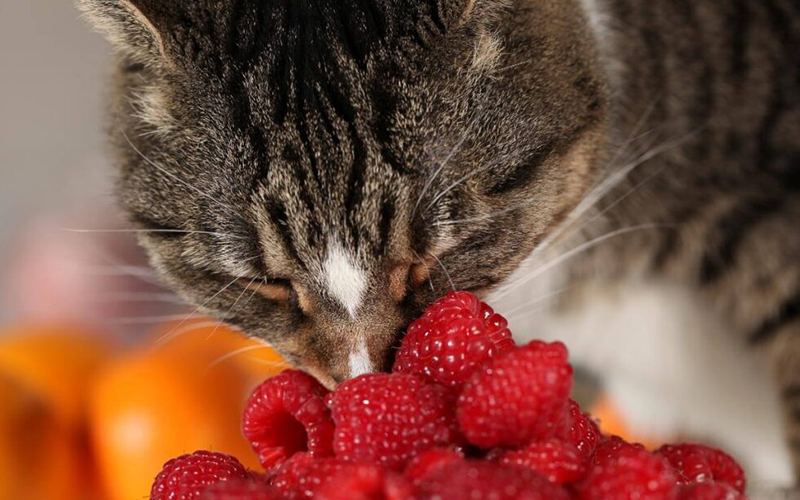Can Cats Eat Raspberries? A Guide to Feeding Raspberries to Your Cat
- 21 Feb 2025 15:41
Raspberries are a delicious and nutritious fruit for humans, packed with vitamins, fiber, and antioxidants. But when it comes to cats, the question arises: "Can cats eat raspberries safely?" The answer is generally yes, but with some important precautions. Let’s dive into the potential benefits and risks of feeding raspberries to your cat, and how to do so safely.

The Benefits of Raspberries for Cats
Low in Calories
Raspberries are relatively low in calories, which makes them a good choice for a treat, especially for cats that are watching their weight. A small amount of raspberry can be a satisfying snack without contributing to excess calorie intake.Rich in Fiber
Raspberries are a great source of dietary fiber, which can help support your cat’s digestive health. While cats are obligate carnivores and don’t require a lot of fiber, a small amount can still aid in digestion and promote healthy bowel movements.Packed with Antioxidants
Raspberries contain antioxidants, such as vitamin C and flavonoids, that help combat free radicals in the body. These antioxidants can support your cat’s immune system and help reduce inflammation, which is beneficial for overall health.Hydration
Raspberries are made up of water, which can help keep your cat hydrated. While cats are generally not known for drinking large amounts of water, offering hydrating treats like raspberries can encourage them to consume more moisture.
The Risks of Feeding Raspberries to Cats
While raspberries have many benefits, there are also some risks to consider before offering them to your cat:
Too Much Sugar
Raspberries contain natural sugars, and while they are relatively low in sugar compared to other fruits, excess sugar can still lead to weight gain and other health issues, especially if your cat consumes them regularly. Too much sugar can also lead to diabetes or digestive upset in some cats. Moderation is key.Gastrointestinal Upset
Like many fruits, raspberries can cause gastrointestinal upset in some cats, especially if eaten in large quantities. Some cats may experience diarrhea, vomiting, or abdominal discomfort. Always introduce new foods slowly and monitor for any adverse reactions.Possible Choking Hazard
Raspberries are small and soft, but they can still pose a choking hazard, particularly for small cats or kittens. Make sure to cut the raspberry into smaller pieces before offering it to your cat to minimize the risk of choking.Pesticide Residue
If you’re feeding store-bought raspberries, they may contain pesticides or other chemicals. It’s important to wash them thoroughly to remove any harmful residues that could be toxic to your cat. Alternatively, you can opt for organic raspberries to reduce this risk.Not Suitable for Cats with Certain Health Conditions
Cats with certain health conditions, such as kidney disease or sensitive stomachs, may not tolerate fruit as well. If your cat has any underlying health issues, it’s always best to consult your vet before introducing new foods into their diet.
How to Serve Raspberries to Your Cat Safely
If you decide to offer raspberries to your cat, here’s how to do it safely:
Wash the Raspberries Thoroughly
Always wash raspberries thoroughly to remove any pesticides or harmful residues before feeding them to your cat.Serve in Moderation
Raspberries should only be offered as an occasional treat. Too many raspberries can lead to digestive issues or contribute to weight gain. Stick to a small portion—one or two raspberries—and only offer them once in a while.Cut into Small Pieces
To avoid any choking hazards, cut the raspberries into smaller pieces, especially if your cat is small or has a tendency to swallow treats whole.Watch for Adverse Reactions
Introduce raspberries slowly into your cat’s diet, and monitor them for any signs of vomiting, diarrhea, or abdominal discomfort. If any adverse reactions occur, discontinue feeding raspberries and consult your veterinarian.
Should You Use PettureX for Your Cat’s Health?
If you’re ever unsure about whether raspberries or any other food is safe for your cat, PettureX offers 24-hour online consultations with pet health professionals who can answer your questions and help guide you on your cat’s diet. With PettureX, you can get expert advice tailored to your cat’s health needs.
Conclusion: Can Cats Eat Raspberries?
In conclusion, cats can eat raspberries in moderation, and they can benefit from the vitamins, fiber, and antioxidants that raspberries provide. However, raspberries should be offered as an occasional treat, and you should always wash them thoroughly, remove any seeds, and cut them into small pieces to minimize the risk of choking. Monitor your cat for any signs of digestive upset or allergic reactions, and avoid feeding raspberries to cats with certain health conditions.
If you’re ever unsure about what’s safe to feed your cat or have any concerns about their diet, PettureX is a helpful resource that provides 24/7 expert guidance to ensure your cat stays healthy and happy.
Related

Frankly Dangerous: Can Cats Eat Hot Dogs? Vet Explains the Serious Risks
- 16 Apr 2025
A Purrfect Protein? Can Cats Eat Ground Turkey Safely? (Vet-Reviewed Guide)
- 16 Apr 2025
Gritty Situation: Can Cats Eat Grits Safely? Vet Explains the Risks
- 16 Apr 2025
Crunchy Query: Can Cats Eat Green Peppers? A Vet-Reviewed Safety Analysis
- 16 Apr 2025
Gravy Danger Zone: Can Cats Eat Gravy Safely? (Vet-Reviewed Warning)
- 16 Apr 2025
Toxic Temptation: Can Cats Eat Grapefruit? Vet Explains the Dangers
- 16 Apr 2025
Emergency Meal or Major Mistake? Can Cats Eat Dog Food For A Couple Days? (Vet Guide)
- 16 Apr 2025
Dandelions & Felines: Can Cats Eat These Common Weeds Safely? Vet Explains
- 16 Apr 2025
Flaky Danger: Can Cats Eat Croissants Safely? Vet Explains the Buttery Risks
- 16 Apr 2025
Hazard Alert: Can Cats Eat Corn Husks? Vet Explains Dangers of This Fibrous Material
- 16 Apr 2025
